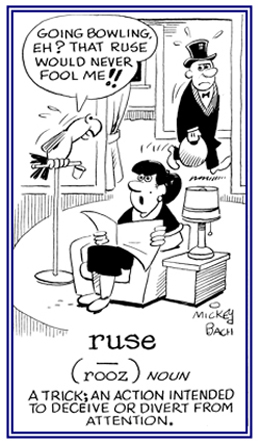caus-
(Latin: cause, reason, purpose; judicial process, lawsuit)
A legal term.
Motto of Dover College, U.K.
The process by which a judicial judge is disqualified on the objection of either party (or disqualifies himself or herself) from hearing a lawsuit because of self interest, bias, or prejudice (or even perceived bias or prejudice).

Go to this Word A Day Revisited Index
so you can see more of Mickey Bach's cartoons.
2. In civil law, a species of exception or plea to the jurisdiction, to the effect that the particular judge is disqualified from hearing the cause by reason of a special interest, incompetence, or prejudice.
3. The challenge of jurors.
4. An act, of what nature soever it may be, by which a strange heir, by deeds or words, declares he will not be an heir.
2. To disqualify or try to disqualify someone from taking part in a decision because of a possible prejudice or personal involvement: "The professor was definitely recusing himself from taking part in the legal action against a company because he was once an employee there."
3. Etymology: "derived from the Middle French word recuser, which came from Latin recusare, "to refuse".
"English speakers started using recuse with the meaning "to refuse" or "to reject" in the 14th century. By the 15th century, the term meant "to challenge" or "to object to (a judge)". The current legal use of recuse as a term specifically meaning "to disqualify (oneself) as a judge" didn't come into general use until the mid-20th century.
Now, the more inclusive applications come from the sense of recusing oneself from such things as debates and decisions; as well as, legal cases in courts of law.
2. Etymology or origin: from Middle English ruser, "to drive back" possibly from Latin recusare "to reject"; from re-, "back" + causari, "to give as a reason."


